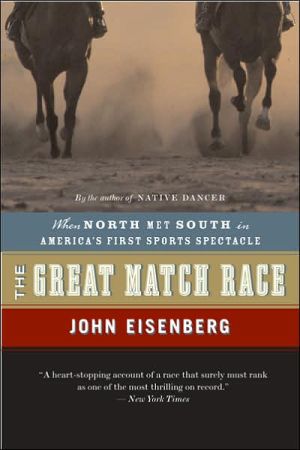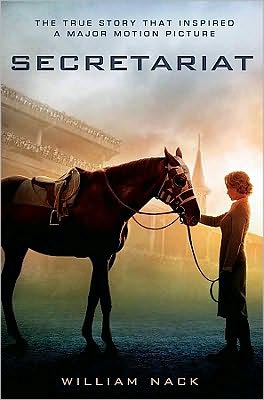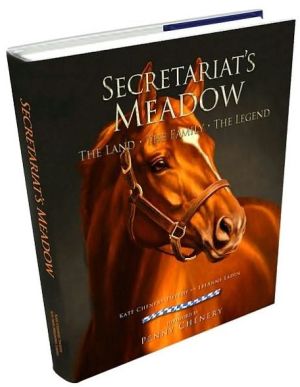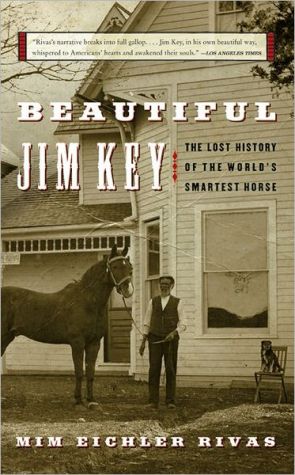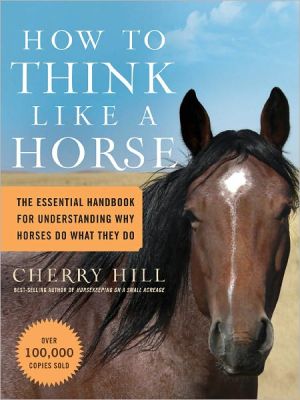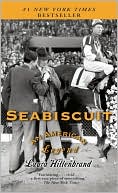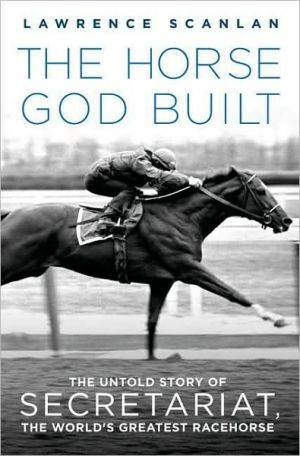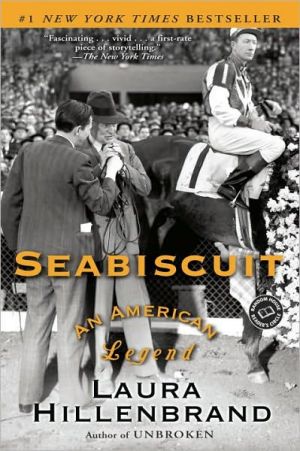The Great Match Race: When North Met South in America's First Sports Spectacle
History meets horse racing in this grand, galloping story about what happened when the greatest horse from the North met the greatest horse from the South.\ In the early 1800s, the notion of sport was still quite new to America, unless you counted cockfighting, chasing foxes, or hunting stags. But on a bright afternoon in May 1823 a horse race held at the Union Course on Long Island changed everything. Astonishingly, sixty thousand people attended—a number equal to roughly half the population...
Search in google:
The Great Match Race is a captivating account of America's first sports spectacle, a horse race that pitted North against South in three grueling heats. On a bright afternoon in May 1823, an unprecedented sixty thousand people showed up to watch two horses run the equivalent of nine Kentucky Derbys in a few hours' time. Eclipse was the majestic champion representing the North, and Henry, an equine arriviste, was the pride of the South. Their match race would come to represent a watershed moment in American history, crystallizing the differences that so fundamentally divided the country. The renowned sportswriter John Eisenberg captures all the pulse-pounding drama and behind-the-scenes tensions in a page-turning mix of history, horse racing, and pure entertainment. Publishers Weekly Early in Eisenberg's detailed, entertaining chronicle of the May 1823 race between two Thoroughbreds-one from the South, one from the North-he recounts a scene that captures his tale's central tension. In the grandstand of the National Course in Washington, D.C., slave-owning Virginia aristocrat William Ransom Johnson watches with dismay as Southern upstart Henry loses to Northern champion Eclipse. Defeated, Johnson vows to "formulate a plan for revenge.... It was time for the South to take this challenge more seriously." Baltimore Sun sports columnist Eisenberg deftly extends the metaphor of Johnson's quest for recognition to the larger conflict brewing between the industrializing North and the stubbornly agrarian South. He builds the tension relentlessly, and as race day approaches, he describes a nation on the edge of its seat. "Just as sports spectacles in ancient Greece, Rome, and England served as substitutes for real war..., the Union Course race pitted one American region against another, one way of life against another." Eisenberg succeeds in creating a gripping yarn of sporting contest, portrayal of a historical moment and smart analysis of a country headed eventually for civil war. Author tour. (May 5) Copyright 2006 Reed Business Information.
The Great Match Race By John Eisenberg Houghton Mifflin Copyright © 2006 John Eisenberg All right reserved. ISBN: 0618556125 Prologue It was a new sound for American ears: the lusty, clattering, sports-stadium roar—sixty thousand people shouting, whistling, stomping, and rattling cowbells, raising a din so forceful it shook the wooden beams supporting the grandstands. The noise was audible for miles, rolling across the countryside like booming thunderclaps in a boot-soaking rainstorm. It would become a familiar sound in the distant future, an archetype of autumn football weekends and summer baseball nights. But in 1823 it was a new phenomenon, a startling sensory assault never heard before. A horse race, of all things, was the occasion, luring a tumultuous horde of sports fanatics that was almost larger than the combined populations of Illinois and Delaware. Before this time, political rallies, prayer revivals, and holiday parades had brought together the largest crowds of Americans, but a ballyhooed duel between the fastest thoroughbred in the North and the fastest in the South had improbably attracted a mob that dwarfed all earlier crowds. Suddenly, on a sunny spring afternoon, a racetrack on Long Island was the nation's fourth-largest city. The country came to a standstill, sweating the outcome of the race between Eclipse, the North's dark,snorting, undefeated champion, and Henry, the South's precocious, brilliantly fast darling. Congress shut down because so many politicians had tickets to see them run. The New York Stock Exchange was closed. Andrew Jackson interrupted his presidential campaign to attend. Public support was evenly divided, and as the animals circled the all-dirt track at the Union Course in Jamaica that day, little business was conducted anywhere else in the twenty-four states. People from Maine to Alabama found their minds drifting to a race that had been anticipated for months and exhaustively analyzed and debated. Many fans had invested more than just their emotions. They had bet hundreds, even thousands, of dollars or, in a few cases, everything they owned. In hindsight this outbreak of raw, irrational passion, a premature burst of American sports mania, was almost an apparition, appearing out of nowhere and vanishing just as quickly. Hoarse, purple-veined sports fanaticism was a concept whose time had not come. Baseball, football, and basketball would not even be discovered for decades, much less organized into popular cultural institutions. Stadiums packed with tens of thousands of noisy fans would not become commonplace until the 1900s. In 1823 the idea of sixty thousand people coming together to watch a sports event was only slightly more fathomable than the idea of a man flying to the moon and walking across a crater. But a boiling brew of intense, hardheaded loyalties had turned the race into more than just a sporting event, setting the stage for this circus to unfurl. The race had become a national refere on what was right and just, a symbol of the developing dispute between northerners and southerners that would eventually tear the country apart. It would be many years before North and South shed blood, but the joy of their celebrated union was already flickering, as evidenced by their increasingly shrill and incessant arguments about slavery, politics, business, morals—any issue that could be dredged up, really. Southerners were smugly accustomed to the upper hand; they had controlled the presidency for almost a quarter-century, easily protected their right to own slaves, and farmed the crops that were helping the fledgling nation rise to its feet. But northerners were rising up against slavery now, fighting back politically, and shrewdly betting their future on industry, not agriculture. America's political, social, and economic winds were slowly shifting. The race between Eclipse and Henry was like a leaf picked up and carried in those breezes, a palpable metaphor of coming change. Southerners, steeped in horse-racing expertise, nuance, and history, saw themselves as the rightful bearers of America's equine legacy, superior in every way to the northerners, whom they saw as clueless dabblers. Yet several of the South's finest horsemen had recently taken on the North's indomitable Eclipse and failed to win, delighting northerners and making southerners increasingly unhappy. After the last southern defeat, William Ransom Johnson decided he had to step in. A charismatic forty-one-year-old Virginia plantation owner, politician, and gambler, Johnson was most of all a cunning and dominant
ContentsPrologue ix 1 Eclipse Against the World! 1 2 If Civil War Must Come 17 3 The Only Legitimate, Respectable Sport 29 4 A Fine Ole Gen’leman 41 5 His Excellency 57 6 This Plan Will Work 74 7 Don’t Spit Your Tobacco Juice 92 8 What a Heat! 102 9 Every Angle Covered 120 10 A Hairline Fracture 131 11 Nothing Is Heard but the Race 142 12 I Have Decided on Our Challenger 155 13 Riders Up! 169 14 Good God, Look! 187 15 You Can’t Do It! 198 16 See, the Conquering Hero Comes 213 17 Ours Was the Best Horse 223 18 Epilogue 234 Author’s Note 242 Bibliographical Note 244 Index 248
\ Publishers WeeklyEarly in Eisenberg's detailed, entertaining chronicle of the May 1823 race between two Thoroughbreds-one from the South, one from the North-he recounts a scene that captures his tale's central tension. In the grandstand of the National Course in Washington, D.C., slave-owning Virginia aristocrat William Ransom Johnson watches with dismay as Southern upstart Henry loses to Northern champion Eclipse. Defeated, Johnson vows to "formulate a plan for revenge.... It was time for the South to take this challenge more seriously." Baltimore Sun sports columnist Eisenberg deftly extends the metaphor of Johnson's quest for recognition to the larger conflict brewing between the industrializing North and the stubbornly agrarian South. He builds the tension relentlessly, and as race day approaches, he describes a nation on the edge of its seat. "Just as sports spectacles in ancient Greece, Rome, and England served as substitutes for real war..., the Union Course race pitted one American region against another, one way of life against another." Eisenberg succeeds in creating a gripping yarn of sporting contest, portrayal of a historical moment and smart analysis of a country headed eventually for civil war. Author tour. (May 5) Copyright 2006 Reed Business Information.\ \ \ \ \ Kirkus ReviewsThe first large-scale U.S. horse race between the rivaling North and South, promoted as a contest of speed versus stamina (or "bottom," in turf parlance). In the 1800s, spectator sports weren't popular. The slowness and difficulty of travel kept people from journeying far from home; baseball, football and basketball were nonexistent; and exercise itself was viewed as "dangerously arousing." The only sport that could consistently draw a crowd was horse racing, and such events were staged only a few times a year. In 1822, William Ransom Johnson, determined to prove the superiority of Southern horses, concocted a challenge to unseat Eclipse, the unbeaten Northern champion. Johnson approached Cornelius Van Ranst and John Stevens, the men in charge of the eight-year-old stallion, proposing a match race at New York's Union Course. Johnson pledged to bring a horse "from anywhere in the land beyond the confines of the North" to be named on race day. The stakes-$20,000-were significant. The match race would consist of two four-mile heats, and in the event of a tie, the horses would run a brutal extra heat, bringing the race's grueling total to 12 miles. Despite Eclipse's age and the unknown caliber of his opponent, the offer was quickly accepted. As 60,000 fans gathered, Johnson-a horseman so renowned he was known as the Napoleon of the Turf-decided to run a fleet youngster named Sir Henry. A nervous Van Ranst deemed Eclipse's usual jockey, 49-year-old Samuel Purdy, too old for the race, replacing him with a younger, inexperienced rider. After Sir Henry easily won the first heat, Purdy was pulled from the stands, and guided Eclipse to victory in the second heat. Sides heaving, legs trembling, theexhausted horses rallied for their third and final match. Spectators held their breath: Would the North or the South prevail?Eisenberg's melding of history and sports journalism is altogether superb.\ \
